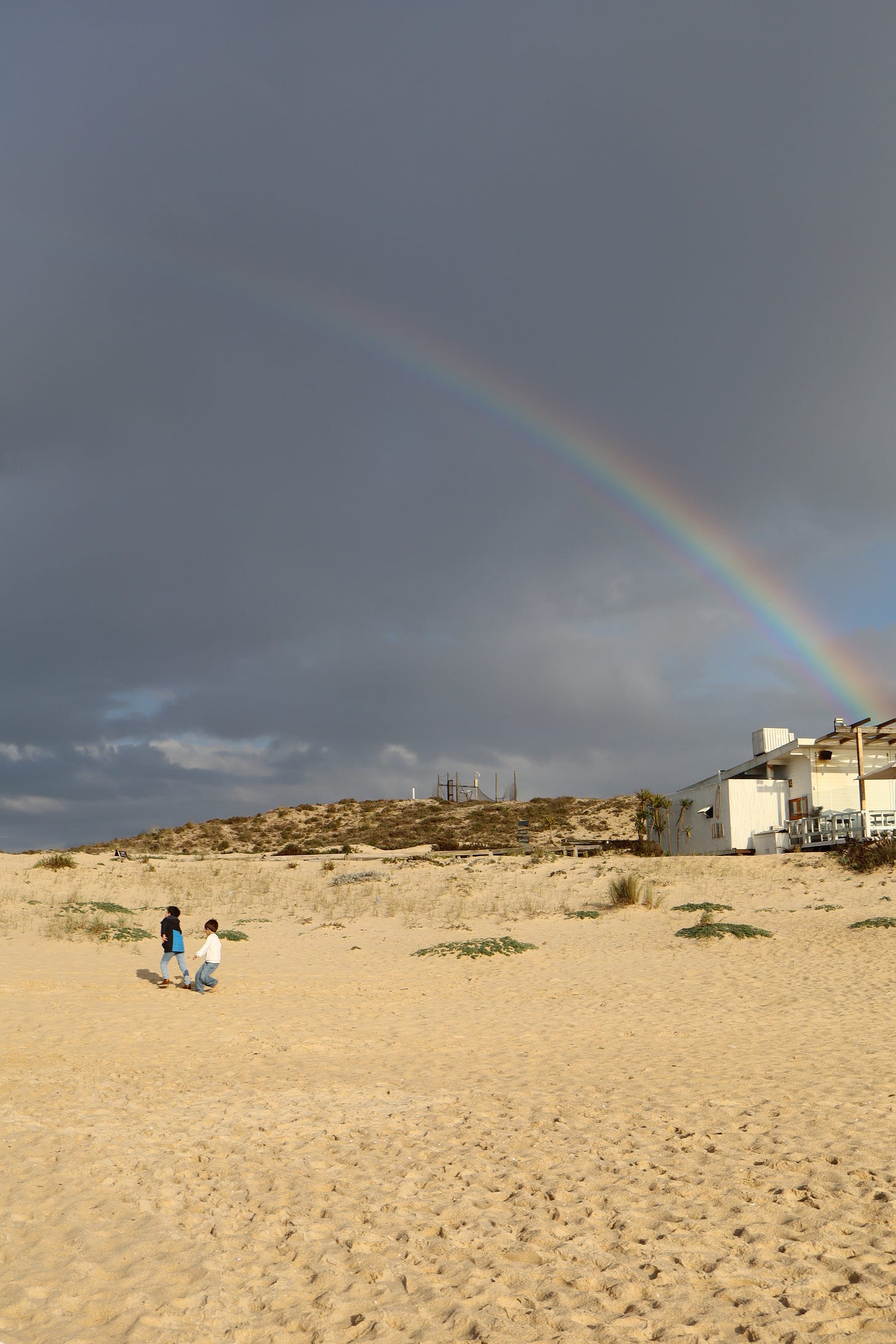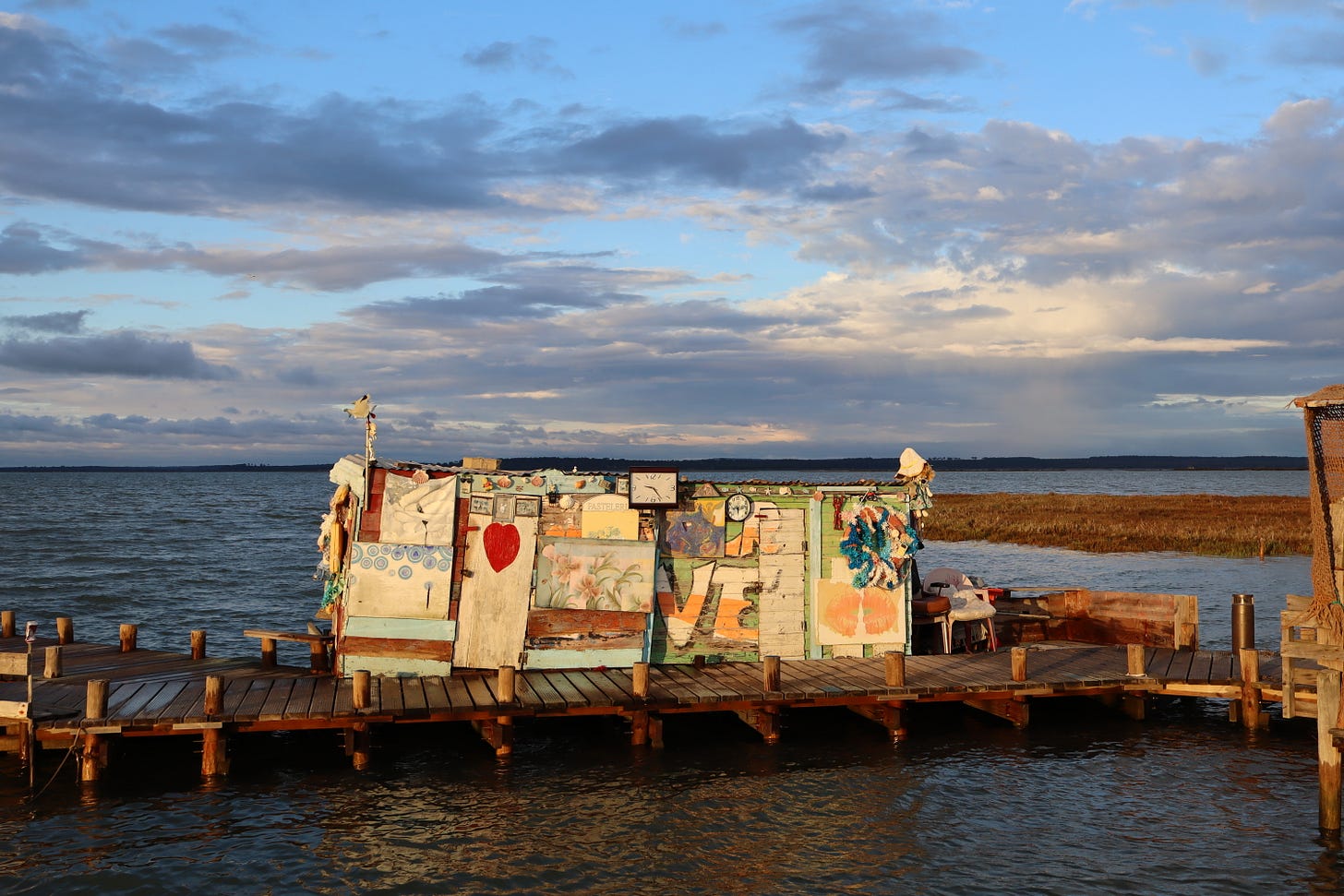I started my trip last Saturday, flying at a familiar time on the airline I’ve used most in my life—but on an unfamiliar route.
Despite years in the U.S., I rarely fly from there to Europe, and it still feels strange to cross so many time zones in a single flight.
Comporta: Reconnecting and Slowing Down
I landed in Lisbon and headed to Comporta, where my cousin Pedro lives with his husband, Gonçalo. The slow start was exactly what I needed after two hectic weeks in NYC—wrapping up work, vacating my apartment, and saying goodbye to friends.
There are many reasons to travel, but reconnecting may just be one of the best.
Pedro and Gonçalo showed me around, and I was mesmerized by the serenity of this small coastal town. The dramatic cliffs and clear rainbows I was lucky to photograph contrasted with the town’s slow pace—something I found especially charming after the madness of NYC.
I appreciated the quality time with Pedro and Gonçalo, whom I rarely see due to our different paths in life. They took me to beaches that get packed in the summer and to the Cais Palafítico, a fishermen’s pier that made for scenic photos.
We also visited Gulato, the artisanal ice cream shop they run, where everything is made in-house with locally sourced ingredients—worth a visit if you’re in the area! Evenings were spent cooking, drinking wine, and sharing travel stories. By the time I left for Faro, I felt recharged.
Hostelling
Faro, one of the main cities in the Algarve region, is bustling in summer but quieter in winter. Still, my hostel was lively, filled with tourists escaping colder parts of Europe.
This was not my first hostel stay, but my first in a long time.
I was 18 when I first walked into a London hostel in peak summer. It was packed with European and American tourists, mostly in their 20s. I was probably the youngest and felt a bit intimidated. I barely drank at the time—and well, European summers.
Now, at almost 30, I was probably the oldest in my 12-person dorm.
Yes, a 12-person dorm. This is a budget trip, so I chose to sleep on the third bunk, next to 11 strangers, to save €4—what it would have cost to upgrade to a 6-person room.
Some things felt unfamiliar:
A guy in my dorm asked me where the nearest supermarket was.
Guests were casually cooking in the hostel kitchen.
The sinks required you to press a button for the water to flow for just a few seconds.
And yet, some things felt oddly familiar:
The dorm environment reminded me of my basketball team trips in Brazil—aimless conversations in a room full of bunk beds.
The hostel’s architecture resembled the hotéis-fazenda (Brazilian countryside lodges) I stayed in during middle school.
The warmth of the staff felt genuine.
The first night at the hostel—a polite cacophony—went fine, and the next morning, I caught a bus to Seville.
Meeting Mr. Orestes
I sat next to an older man, probably in his mid-70s.
I assumed he was British or German, so I greeted him in English—no response. Then, I noticed a date written in Portuguese on his phone and struck up a conversation.
Let’s call him Mr. Orestes from now on.
Mr. Orestes was heading to Spain after competing in an orienteering event in Portugal.
To his surprise, I knew what orienteering was—thanks to my former Swedish colleagues, who often talked about the sport.
(Quick explainer: Orienteering is a race where you navigate through a forest using only a map. The first to hit all checkpoints wins. It requires fitness and strong navigation skills—hence the name.)
He spoke passionately about how the sport kept him active and had taken him to visit Europe many times.
In Brazil, he told me, only about 5,000 people practice it regularly.
I found it wholesome—a man in his 70s still running through the woods. Not what I expected when I boarded the bus.
The Conversation Takes a Turn
Then, the conversation shifted.
Mr. Orestes mentioned that he had lived in many places in Brazil, thanks to his career in the military, which spanned from 1968 to the early 2000s.
To build rapport, he told me he had also lived in Rio—from 1968 until 1974.
A Quick History Summary
For those less familiar with Brazilian history:
Brazil was under military rule from 1964 to 1985
The economy grew, like other commodity-based economies at the time, but it was a period of oppression where many people went missing and rights were widely ignored
Protesters were silenced, opposition leaders were forcefully removed from congress, and the military acted without regard for due process
In 1968, Institutional Act #5 was enacted, ushering in a period of brutal repression—when people were tortured, disappeared, or killed
This was especially true in Rio, which, though no longer the capital, remained politically and culturally significant. For example, all the embassies remained in Rio until the 60s
It was during this time that Mr. Orestes was stationed in Rio.
When I asked where exactly, he said he had spent most of his time at the Tijuca barracks—one of the most infamous military posts, linked to torture and killings.
My throat went dry.
There was a real possibility that the man sitting next to me had participated in, or at least been complicit in, some of the dictatorship’s worst atrocities.
I let the conversation fizzle out.
He started commenting on the scenery: “Look at the strawberry fields.”
Probing the Past
If he had been involved in anything sinister, one could argue he was just following orders—the military culture is not one of questioning superiors, and rank and file members only follow the rules.
So I decided to probe, feigning curiosity.
“Sir, have you seen the movie I'm Still Here? It just won the Oscar for Best International Feature.”
He scoffed. “Oh, that movie,” dismissively.
(For context: The film, beloved across Brazil’s political spectrum, tells the real-life story of a mother of five fighting for the state to acknowledge that her husband—a former congressman—was killed after being taken in for ‘questioning’ by the military.)
We didn’t discuss it.
After a few minutes, he resumed commenting on the landscape. “The vineyards, how pretty.”
A Shocking Statement
Still uneasy but intrigued, I pressed further.
“What do you think about the recent plea bargain deal? The one where a lieutenant-colonel’s testimony led to the arrest of a general and complicated the former president’s legal situation?”
Without hesitation, he said:
“Oh, he was tortured into taking that deal!”
I couldn’t believe what I had just heard.
Here was a man who had lived through Brazil’s darkest years—perhaps even participated in its brutal history—now claiming that a high-ranking officer, questioned alongside his lawyer in an air-conditioned room, was a victim of torture.
Naturally, we debated.
A Rare Chance to Burst the Bubble
Today, most political debates happen online, where echo chambers dominate. This was a rare opportunity to talk to someone whose worldview was fundamentally different from mine.
But the ride also served as a reminder: in Brazil, where some still push for amnesty after a recent coup attempt, the memory of dictatorship is far from distant history. Some never learned from the past—and if a new amnesty is granted, they never will.
We still had 30 minutes before reaching Seville.
“Look at the olive trees,” Mr. Orestes said.
Upcoming Itinerary
📍 March 9: Chefchaouen, Morocco
📍 March 10: Fès, Morocco
📍 March 11: Meknès, Morocco
📍 March 12-13: Marrakech, Morocco
📍 March 14: Porto, Portugal
Got recommendations? Let me know!
4o





